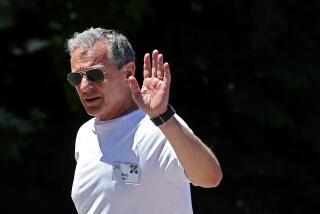Rockwell Realigning Top Management : Strategy: Analyst says company seems to be setting up orderly succession for eventual retirement of the chief executive.
- Share via
SEAL BEACH — Rockwell International Corp. said Tuesday it is realigning its top management, and an analyst who follows the company said it appears to be setting up an orderly succession for the eventual retirement of Chairman and Chief Executive Donald R. Beall.
Sam F. Iacobellis, 63, who shared the No. 2 job as co--chief operating officer, becomes deputy chairman for major programs. Kent M. Black, 53, the other chief operating officer, now has that job to himself.
The company said that, even with the changes, neither man--both executive vice presidents--outranks the other.
Promoted were Don H. Davis, 53, and John A. McLuckey, 53, who become senior vice presidents.
“There aren’t any surprises here,” said Gary J. Reich, an aerospace analyst at the brokerage Lehman Bros. in New York. “What they’re doing is arranging the succession to Beall.
“One of these people in that announcement will replace him.”
That doesn’t seem likely to occur soon, however. Beall is only 54 years old, and the customary retirement age at Rockwell is 65.
Beall, a 25-year veteran of the giant Seal Beach defense contractor, will continue to be the only employee on the Rockwell board.
The company said Iacobellis got the title of deputy chairman because he will represent Beall to big customers and to government agencies on programs like the B-1B bomber, the space station and the space shuttle.
Black, who was chief operating officer for the company’s auto parts, telecommunications and defense and aerospace electronics units, will now get the space, aircraft and propulsion businesses too.
Black, Iacobellis, Davis and McLuckey will also serve on a new corporate strategy committee that advises Beall.
The purpose of all those changes, Rockwell said, is to spot more opportunities to sell to government and get the sprawling company’s various units to cooperate more on developing products.
“This is an evolutionary rather than a revolutionary change,” stock analyst Reich said. “If all companies did this in such an orderly way, there’d be far fewer negative surprises when the chairman retires.”
More to Read
Inside the business of entertainment
The Wide Shot brings you news, analysis and insights on everything from streaming wars to production — and what it all means for the future.
You may occasionally receive promotional content from the Los Angeles Times.










